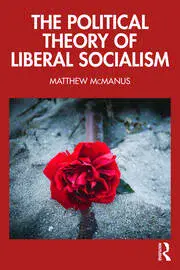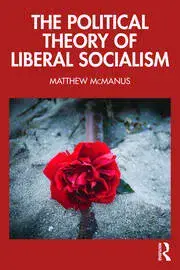Liberal Socialism is Worth Your Consideration
Matt McManus has been a unique Left writer for years, prominent for extensive reviews debunking various abjectly wretched conservative philosophical and political arguments. McManus takes reactionary ideas seriously, takes his time dissecting them, and respects his readers as he works methodically. The results are controlled demolitions of right-wing fever dreams, from “wokeness” to post-modern Marxism. Conservatives gutsy enough to engage with real leftist criticism have a writhing hatred for his work, while leftists have often appreciated his thoughtful approach and for reading books many of us would prefer to leave on the shelf.
But McManus writes of his new work, “None of my books have aroused so much anger before it was even written. So much so that the book’s sole impact may be uniting readers across the political spectrum in rejection.” My kind of project!
McManus’s new book, The Political Theory of Liberal Socialism, aims for a reconciliation of ideas thought to be antithetical, liberalism and socialism. Seen as the political ideologies of capitalism and opposition to it, respectively, McManus primarily surveys historic figures to build an intellectual history of liberal socialism. He takes a measured approach and draws a number of subtle distinctions, but no matter one’s final verdict on the possibility, this book will spark a good deal of thought.
Ambiguous boundaries
Anticipating that many would view the project as an oxymoron, McManus begins by recognizing that liberalism and socialism are both really sets of schools of thought, and some of both have overlapping values. McManus suggests liberal socialism would be “the most persuasive conception of justice yet developed,” and connects the framework to the US Great Society and especially the socialist Swedish Meidner plan.
For the idea itself, McManus gives a “Core definition…liberal socialism is committed to instituting a basic social structure securing the equal emancipation of all society’s members as a basis for their shared long-term flourishing,” with “the extension of liberal democratic principles into the economy.”
An important starting point is “methodological collectivism”—a perhaps sinister- sounding recognition that we are utterly dependent on one another for our functioning society. McManus pointedly opposes this reality with the orthodox individualist methodology used by conventional liberalism, and while accepting the essential need for economic systems to promote human flourishing including on an individual level, the approach is toward collective solutions to our collective problems.
sounding recognition that we are utterly dependent on one another for our functioning society. McManus pointedly opposes this reality with the orthodox individualist methodology used by conventional liberalism, and while accepting the essential need for economic systems to promote human flourishing including on an individual level, the approach is toward collective solutions to our collective problems.
For liberalism to be relevant in the twenty-first century, McManus says it must reflect “on what its fellow Enlightenment doctrine, socialism, knew: That capitalism had an enduring tendency to establish new and vulgar forms of plutocratic rule in place of the old aristocracy liberals despise.”
McManus argues that socialism’s goals of equality and solidarity “are quite similar to the basic principles which liberals are committed to…with the notable exception that the republican principle of community and solidarity is embraced and extended to the economy in a way that would be very controversial among liberals.” The equality of opportunity of liberalism was an improvement from monarchical control, but would only be improved by socialism’s rough equality of outcome.
Liberalism historically called for equality before the law, creating civil equality before the state but allowing private citizens to amass staggering wealth and power after the industrial revolution. Thus as Eduard Bernstein is quoted, “with respect to liberalism as a historical moment, socialism is its legitimate heir, not only chronologically, but also intellectually.”
For my part, I favor the remark from Rudolf Rocker: “Democracy with its motto of ‘equality of all citizens before the law,’ and Liberalism with its ‘right of man over his own person,’ both shipwrecked on the realities of the capitalist economic form. So long as millions of human beings in every country had to sell their labour-power to a small minority of owners, and to sink into the most wretched misery if they could find no buyers, the so-called ‘equality before the law’ remains merely a pious fraud.”
Triggered libs
McManus is at pains to position his book less as a definitive theory or defense of liberal socialism than a project of “retrieval,” reappraising intellectual figures to trace the development of his liberal theme. Earlier figures like Thomas Hobbes are often “startingly egalitarian,” not anticipating how industrial capitalism would stack up psychotic fortunes and towering corporate empires, wrecking the relative equality expected from commercial freedom.
After reviewing the surprising insights of Thomas Paine, McManus spends some time on JS Mill, famously seminal to liberalism, but also late in life to socialism, which he identified with despite his name being nearly synonymous with liberalism among intellectuals. He came to reject capitalist relations as natural and acquisition as life’s goal. Coming in time to accept a gradual expropriation of capitalists by the workers and their taking over management, McManus calls Mill’s “mature political theory” the first full theoretical argument for a liberal socialism, even as he remained a normative individualist. Marx denounced him for trying to “reconcile the irreconcilable,” arguably like McManus himself.
The section on Marx himself is particularly interesting due to his enduring scathing critique of liberalism as the ideology of capitalism and class rule, and Marxists are likely to criticize liberal socialism’s “reformist dimension.” McManus sets out to show, I think convincingly, that Marx’s view of liberalism was “more complex than wholesale rejection.”
Marx does observe that liberalism, for all its cooptation by the bourgeouisie, was a real advance on the feudal era. And despite his calls for centralized state control, he refers often to democracy and praised the Paris Commune. “What is clear is Marx’s relentless concern for non-domination through maximizing what we now call social/civic or republican freedom. In republican thought, freedom is conceived not just as license, but as not being subject to the will of another by having an active say in one’s governance…What makes Marx’s account of non-domination and social freedom distinctive is the extension of these political concerns to the economy.”
More to the point, McManus suggests it’s “more accurate to claim that Marx felt liberal rights would be transcended rather than annihilated in a transition to socialism.” At the same time, McManus reasonably observes that the Soviet “legacies of community authoritarianism and the failures of the command economies are sufficiently evident to suggest that a little liberalism goes a long way.”
Numerous other great thinkers are reviewed and their sympathies appraised, including economist JM Keynes, who indeed later in life used the phrase “liberal socialism,” in a personal evolution open to interpretation. McManus concludes he desired “a kind of liberal market socialism where private firms would largely still operate,” where the “state, not the market, would make the bulk of the large-scale capital-investment decisions” while private firms operated with heavy regulations. A goal seeming some distance from recognizable socialism, but still interesting. Liberal philosopher John Rawls, a McManus favorite, gets similar treatment reviewing exactly how socialist his liberalism became, though he is faulted for a lack of serious analysis of the “fluidity and ubiquity of economic power.”
Whither liberalism
Marxists and liberals will doubtless line up to criticize McManus’s book, mostly sight unseen of course in the modern manner. But the author has spent years on end reading and reviewing for leftists the most abysmal, godforsaken conservative books, to the point that in my view he has frankly well-earned the benefit of the doubt for his new book.
McManus surveys socialist and liberal thinkers to determine if the ideals of socialism are contradictory with liberalism, or its fulfillment. The reader may come away moved to a deeper compatibility and development, or more convinced than ever of their antithetical nature. But the book is a fun easy read and thought-provoking, and has a positive ecumenical intellectual attitude.
Is liberalism the heart of reaction or the predecessor of a richer socialist future? You’ll enjoy considering the question with McManus’s new book.
The post A Study in Contradictions appeared first on CounterPunch.org.
From CounterPunch.org via this RSS feed


